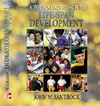 |  Life-Span Development: A Topical Approach John W. Santrock
Social Contexts of Development Schools, Achievement, and Work
Web LinksPeer Relations
(http://ericae.net/edo/ED345866.HTM)
Explore peer acceptance and teachers' and parents' roles in children's peer relations. |
 |  |  | Peer Conflicts
(http://www.ed.gov/databases/ERIC_Digests/ed372874.html)
An ERIC Digest paper on peer conflicts in the classroom, including ideas about the structure of peer conflicts. |
 |  |  | Aggressive Boys, Friendships, and Adjustment
(http://www.gospelcom.net/narramore/bk_114_delinq2.htm)
A prevention program designed to reduce externalizing problems and prevent delinquency. Includes the impact of the program on friends' behavioral characteristics. |
 |  |  | Play
(http://www.kidsource.com/kidsource/content2/nature.of.childs.play.html)
Examine different types of play, the adult's role in children's play, and other play topics. |
 |  |  | Friendships
(http://ericps.crc.uiuc.edu/eece/pubs/digests/1992/hartup92.html)
A leading expert on children's friendships, Willard Hartup, examines the factors involved in making and keeping friends, as well as friendships in school settings. |
 |  |  | Adolescent Peer Relationships
(http://www.personal.psu.edu/faculty/n/x/nxd10/peers2.htm)
Explore many aspects of adolescent peer relationships, including cliques and crowds, parental/peer influences, peer pressure, peer statuses, and other topics. |
 |  |  | Peer Pressure
(http://www.familyfocus.com/html/peer_pressure.html)
Examine various dimensions of peer pressure, including its positive aspects and how to handle it. |
 |  |  | Social Aging Resources
(http://www.aarp.org/cyber/sitealph.htm)
Extensive links to many aspects of social aging, including generational discussions, information networks, aging with dignity, and much more. |
 |  |  | Social Psychology of Aging
(http://www.trinity.edu/mkearl/gersopsy.html)
Explores historical aspects of aging, stereotypes of aging, social roles involving aging, and gender/ethnicity issues. |
 |  |  | Ageism Resources
(http://falcon.jmu.edu/~ramseyil/ageism.htm)
Links to many resources involving ageism, including strategies for promoting positive images of older adults. |
 |  |  | Successful Aging
(www.usnews.com/usnews/issue/980427/27edit.htm)
Read about the increasing belief that is important to conceptualize aging as "successful aging" rather than aging being all decline. |
 |  |  | Growing Older and Better
(http://www.kaiserpermanente.org/toyourhealth/hottopics/growing/)
A positive look at older adults include information about what is takes to age successfully. |
 |  |  | The Web of Culture
(http://www.webofculture.com)
You can explore many cultures around the world at this website. Includes information about education and religion in different cultures. |
 |  |  | Global Internet Communication
(http://www.globalclassroom.org/)
An outstanding website with links to many global communication projects, including Global SchoolNET, Intercultural E-Mail Classroom connections, the JASON Project, and Global Show-n-Tell Museum. |
 |  |  | The Global Lab Project
(http://www2.edc.org/NCIP/)
Global Lab brings together over 100 classrooms around the world for the purpose of improving secondary science education. You can read about the value of global communications as a teaching tool. |
 |  |  | Cross-Cultural Comparisons
(http://www.fit.edu/CampusLife/clubs-org/sccr/)
The website of the Society for Cross-Cultural Research with articles on cross-cultural research, a cross-cultural newsletter, and links to many websites with information about cross-cultural comparisons. |
 |  |  | Old Age Across Time and Cultures
(http://www.trinity.edu/~mkearl/ger-cul.html)
Explore numerous aspects of older adults at different points in history and across different cultures. |
 |  |  | Children, Youth, and Poverty
(http://www.futureofchildren.org/cap/index.htm)
This entire issue of The Future of Children is devoted to poverty in childhood and adolescence. You can read the full text of the articles at this web site, including such topics as why so many children and youth are poor, the effects of poverty on children and youth, and intervention programs. |
 |  |  | Poverty in Canada
(http://www.hrdc-drhc.gc.ca/hrdc/epoverty.html)
Examine the extent of poverty in Canada, including information about families and youth. |
 |  |  | Research on Poverty
(http://www.ssc.wisc.edu/irp/)
The web site of the Institute for Research on Poverty at the U. of Wisconsin-Madison. Read about how poverty is measured, the extent of poverty in children and youth, sources of information about poverty, and the causes and consequences of poverty. |
 |  |  | Migration and Ethnic Relations
(http://www.ercomer.org/wwwvl/index.html)
An excellent resource for learning more about migration and ethnic relations with links to many related websites. |
 |  |  | Immigration: Journals and Newsletters
(http://www.ercomer.org/)
Link up with a wide array of journals and newsletters with information about topics related to immigration and ethnic groups. |
 |  |  | Immigrant Families
(http://www.futureofchildren.org/cri/06cri.htm)
This paper evaluates a number of research and policy issues involving immigrant families. |
 |  |  | Exploring Diversity
(http://www.inform.umd.edu/EdRes/Topic/Diversity/)
The diversity database of the U. of Maryland will enable you to explore many facets of diversity, including ethnicity, socioeconomic status, gender, and religion. |
 |  |  | Ethnic Minority Families
(http://web.missouri.edu/~c539613/ncfrgrps.html)
Read about African American, Asian American, Native American, Latino, and multicultural families. |
 |  |  | African Americans
(http://www.georgetown.edu/crossroads/asw/race.html)
This American Studies website includes information about many aspects of the lives of African Americans and their cultural background. |
 |  |  | Latinos and Native Americans
(http://www.gac.edu/~mhirsch/geo3.html)
This is part of a history/social studies website for K-12 teachers and includes a wide range of information about Latinos and Native Americans, as well as women. |
 |  |  | Asian Americans
(http://www.mit.edu/activities/aar/aar.html)
Explore many aspects of the lives of Asian Americans, especially their cultural ties. |
|



 2002 McGraw-Hill Higher Education
2002 McGraw-Hill Higher Education